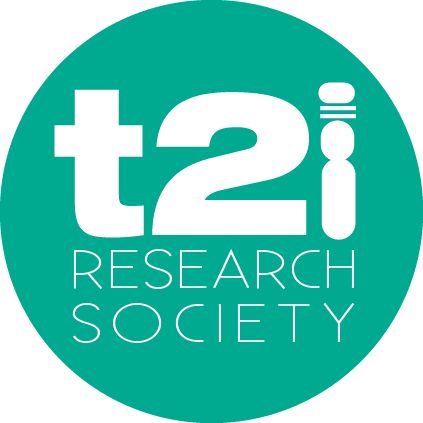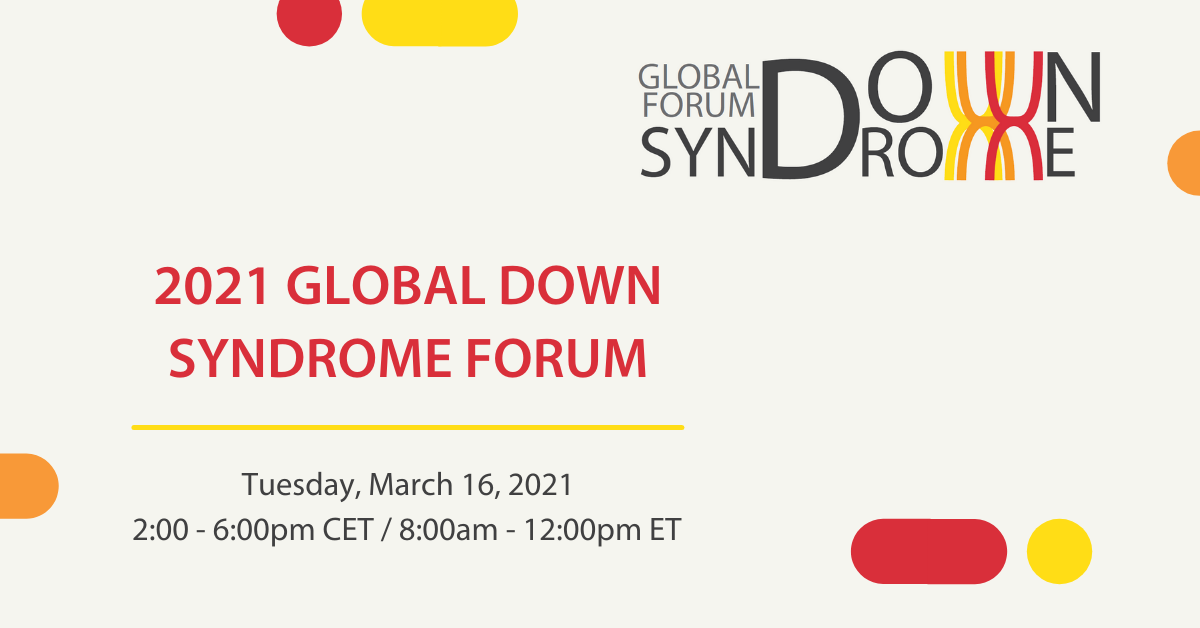

|
|
T21RS Activities
Last Days to Apply for T21RS Grants to Support Scientific Events
T21RS is pleased to announce the launch of the fifth call for funding the organization of scientific and dissemination events of T21RS members, such as scientific meetings and events, which will contribute to increase the public visibility of Down syndrome research and of T21RS.
The activities have to be targeting a wide audience and they may range from local activities on specific topics to multidisciplinary activities with a strong international participation. The maximum amount funded by event is 500€.
If you are a member of the T21RS and are planning a new scientific meeting or an event related to Down syndrome research, we encourage you to apply this call. For more information of submission and evaluation, Click here
|
|
Join our 7th Webinar Edition
T21RS is pleased to invite you to the free webinar hosted by the Education and Training
Committee. In this talk, Prof. Fabio Di Domenico will present the topic:
“Deciphering the short circuits of proteostasis network in Down
syndrome”
March 2, 5:00 PM Central European Time (11:00 AM USA Eastern Time)
|
|
T21RS Virtual Conference 2021: Call For Abstracts
Deadline Extended Until March 15, 2021
We are excited to announce our inaugural data blitz on June 8, 2021 during our T21Rs virtual conference.
A data blitz is a series of 5-minute talks, each covering just a single powerpoint slide. It will offer a fast-paced overview of some of the most exciting research presented by promising junior investigators.
The scientific program committee will select abstracts and invite authors (undergraduate, graduate students and postdoctoral investigators (within 5 years of being awarded their PhD) to record a 5-minute video presentation. Video presentations will be combined into a pre-recorded data blitz that will be shown at the meeting live.
|
|
Next T21RS Newsletter Around WDSD
T21RS will launch a special newsletter to promote activities organized around the WDSD (World Down Syndrome Day). 21 March is a global recognition day which has been officially observed by the United Nations since 2012 in order to raise public awareness of Down syndrome. T21RS would like to disseminate the activities organized by our members worldwide. If you are organizing an event on WDSD and want to share with the Down syndrome research community, please send an email before March 9 with the information to info@t21rs.org.
|
|
GO-DS21 EU-Project: Succesful 2nd General Assembly MeetingDS21 EU-PROJECT: SUCCESSFUL 2nd GENERAL ASSEMBLY MEETING
GO-DS21 is an H2020 project funded by the European Commission (grant agreement No 848077) with the aim of unraveling the intrinsic and extrinsic mechanisms that impact Down syndrome comorbidity, focusing on obesity and intellectual disability. The project’s objectives are to improve diagnosis, to identify prognostic factors, and to establish recommendations and targeted interventions. The ultimate goal is to prevent or minimize comorbidities in people with Down syndrome. T21RS representatives attended the second General Assembly (GA) Meeting in February which was held online. Despite the pandemic, the project is on track, and we will soon be able to share first results!
For more information about the project click here

|
|
COVID-19 and Down Syndrome
T21RS International Study Finds Increased COVID-19 Mortality Among Adults With Down Syndrome
T21RS COVID-19 taskforce has recently published in The Lancet’s EClinical Medicine the results from the international survey of clinicians and caregivers of individuals with Down syndrome infected with COVID-19 between April and October, 2020. Survey respondents were mainly from Europe, the United States, Latin America and India.
Research has found increased COVID-19 mortality among adults with Down Syndrome compared to the general population, supporting the need to prioritize vaccination for those with the genetic disorder.
Investigators found that adults with Down syndrome were roughly three times more likely to die from COVID-19 than the general population. This increased risk was especially apparent after the fifth decade of life: A 40-year-old with Down syndrome had a similar risk of dying from COVID-19 as someone 30 years older in the general population. However, as in the general population, the risk of death in younger people and children with Down syndrome was considerably lower than in older adults.
The results of the study were recently published in The Lancet’s EClinical Medicine
The study was funded by Down Syndrome Affiliates in Action, Down Syndrome Medical Interest Group-USA, GiGi’s Playhouse, Jerome Lejeune Foundation, LuMind IDSC Foundation, The Matthew Foundation, National Down Syndrome Society, National Task Group on Intellectual Disabilities and Dementia Practices, and also supported by stakeholder representatives from Global Down Syndrome Foundation (USA), DSA (UK), DSMIG (UK), DSMIG (USA), DSRF-UK, DSi, DSE international, Trisomie21-France, Down España, National Down Syndrome Congress (NDSC), Down Madrid, Fundació Catalana Síndrome de Down (Spain), EDSA, Royal College of Psychiatrists, CoorDown (Italy), Associazione Italiana Persone Down (AIPD; Italy), AFRT (France), Fundación Iberoamericana Down 21 (Spain), FIADOWN (Latin America), Federação Brasileira das Associações de Síndrome de Down (Brazil) and the European Down Syndrome Association.
|
|
Worldwide Prioritizing the Vaccination of Individuals With Down Syndrome Against SARS-CoV-2
Scientific evidence, the results of T21RS survey among others, and the push exerted by researchers and Down syndrome associations are getting the individuals with Down syndrome to be considered as a risk population for COVID-19 and be prioritized in the vaccination programs.
In the UK, the Joint Committee on Vaccination and Immunisation (JCVI) have now prioritized vaccination for all adults with intellectual disabilities, and those with intellectual disabilities in long-stay nursing and residential care settings in priority group 6, while people with Down syndrome have been included in group 4.
In US, the CDC (The Centers for Disease Control and Prevention) included Down syndrome as a ‘high-risk medical condition’. Now it’s up to each state to decide in which phase individuals with Down syndrome will be vaccinated. For example Ohio has already started to vaccinate individuals with Down syndrome and Georgia will make their decision in the next few days. You can check the situation of the different states following the links that appear in this article of the Wall Street Journal published in late January: How to Get a Covid-19 Vaccine: a State-by-State Guide - WSJ.
In Spain, The Spanish Society of Preventive Medicine, Public Health and Hygiene (SEMPSPH) has recommended the vaccination of individuals with Down syndrome as scientific evidence indicate similar risk factor as those over 70 years of age. Down España and several political parties are pushing to The Spanish Ministry of Health to prioritize vaccination for adults with Down syndrome. T21RS wishes the inclusion of this population within the priority vaccination groups. Read Article Here ( Available in Spanish)
|
|
COVID-19: Prioritizing The Vaccination of Individuals With Down Syndrome in Germany
by Tilman R. Rohrer, MD
On 10 December 2020, the Robert Koch Institute (RKI), the federal government agency and research institute for disease control and prevention in Germany, requested that scientific recommendations be developed for the Federal Minister of Health and the Standing Committee on Vaccination (STIKO) as a basis for establishing prioritization criteria for vaccination against SARS-CoV-2.
A working group, which I was invited to join as a clinician specializing in Down syndrome, was established and tasked with evaluating the literature on COVID-19 in individuals with trisomy 21. At the time, four published studies were available, a large study from the United Kingdom (Clift et al. 2020), one from the United States (Malle et al. 2020), and two case studies (Krishnan et al. 2020; Ahmad et al. 2020).
In particular, the large population-based cohort study by Clift et al., which analyzed the data of 8.26 million adults in the UK, estimated that the adjusted risk of COVID-19-related death in patients with Down syndrome was 10 times that of the general population (hazard ratio [HR], 10.4; 95% confidence interval [CI], 7.1–15.2) and COVID-19-related hospitalizations were increased 5-fold [HR: 5.0; 95% CI 3.6–6.7).
Based on this analysis, STIKO and the Federal Ministry of Health on 18 December 2020 placed people with Down syndrome in the second-highest of three top-priority vaccination categories, together with, e.g., transplant patients, patients with severe chronic disease, and high-exposure healthcare professionals.
Prioritized coronavirus vaccination of individuals with trisomy 21 is now underway in Germany.
|
|
Down Syndrome & COVID-19 : What you should know.
|
|
T21RS Supporting Associations
Down España
DOWN ESPAÑA is the reference organization of Down syndrome in Spain. The organization was founded in 1991 as an initiative of the family association movement with the aim of social integration of people with Down syndrome. DOWN ESPAÑA has 90 federated organizations, with innovative training and intervention projects, that promoted research and awareness-raising actions.
Our aim is to facilitate the inclusion of people with Down syndrome in all areas of their lives and to ensure compliance with the International Convention on the Rights of Persons with Disabilities and Sustainable Development Goals.
Our guiding values are: human diversity, autonomy, inclusion, universal design, use of community resources and spaces, the person at the center, gender equality, unity, ethical and responsible management and neutrality.
One of our objectives is to improve the health of people with Down syndrome. Through the DOWN HEALTH PROGRAM we promote several projects to empower people with Down syndrome and their families in health care. Some of our projects are the Health Program for People with Down syndrome, the Down Health App or the Sexuality and Affectivity Program.
DOWN ESPAÑA has a medical advisory board, made up of eight medical professionals from different fields. Its fundamental mission is to provide guidance and advice in the medical and health fields concerning the health of people with Down's syndrome. It also participates in the definition of health priorities and actions to be taken.
We are committed to research on Down syndrome and we are active members and collaborators of T21RS. From our organization, we have actively collaborated in the research promoted by T21RS to find out how COVID-19 affects people with Down syndrome, collaborating in the process of collecting cases and in the dissemination of the results reports.
This type of initiative highlights the need for collaboration between different organizations to promote research on Down syndrome in different areas.
All the information about DOWN ESPAÑA and its activities is available in our website.
|
|
Highlighted Publications in Down Syndrome Research
Down Syndrome and Alzheimer’s Disease Professional Interest Area
PIA Year in Review 2020

|
|
Down Syndrome and COVID-19: A Perfect Storm?
Joaquin Espinosa. Cell Rep Med. 2020 May 19.
People with Down syndrome show signs of chronic immune dysregulation, including a higher prevalence of autoimmune disorders, increased rates of hospitalization during respiratory viral infections, and higher mortality rates from pneumonia and sepsis. At the molecular and cellular levels, they show markers of chronic autoinflammation, including interferon hyperactivity, elevated levels of many inflammatory cytokines and chemokines, and changes in diverse immune cell types reminiscent of inflammatory conditions observed in the general population. However, the impact of this immune dysregulation in severe acute respiratory syndrome coronavirus 2 (SARS-CoV-2) infection and CoV disease of 2019 (COVID-19) remains unknown. This Perspective outlines why individuals with Down syndrome should be considered an at-risk population for severe COVID-19.
|
|
Nutritional challenges in children and adolescents with Down syndrome
Marianne Nordstrom, et al. Lancet Child Adolesc Health. 2020 June.
Several features and comorbidities in Down syndrome have nutritional implications and consequences. In infancy and early childhood, children with Down syndrome have a high risk of oral motor difficulties and pharyngeal dysphagia with aspiration, which both require systematic attention. To improve nutritional status in children who are underweight and who have clinical signs of feeding problems, further evaluation of underlying causes is required. Clinical interventions should promote swallowing safety and development of feeding abilities. Even from 4-5 years of age, overweight in children with Down syndrome can be a concern. To prevent disease later in life, an urgent need exists for more research on nutritional aspects in the prevention and treatment of obesity in adolescents with Down syndrome. This review did not find any data to support the use of dietary supplementation, except when deficiency is documented. Additionally, the literature reported the need for more research that uses larger study samples and control groups and that addresses important nutritional challenges in children and adolescents with Down syndrome.
|
|
Medical Care of Adults With Down Syndrome: A Clinical Guideline
Amy Y Tsou, et al. JAMA. 2020 Oct 20.
Down syndrome is the most common chromosomal condition, and average life expectancy has increased substantially, from 25 years in 1983 to 60 years in 2020. Despite the unique clinical comorbidities among adults with Down syndrome, there are no clinical guidelines for the care of these patients. The objective of this study was to develop an evidence-based clinical practice guideline for adults with Down syndrome. Only 1 strong recommendation was formulated: screening for Alzheimer-type dementia starting at age 40 years. Four recommendations (managing risk factors for cardiovascular disease and stroke prevention, screening for obesity, and evaluation for secondary causes of osteoporosis) agreed with existing guidance for individuals without Down syndrome. Two recommendations for diabetes screening recommend earlier initiation of screening and at shorter intervals given the high prevalence and earlier onset in adults with Down syndrome.
|
|
Links to the Latest Research Information News
- Adults with Down syndrome more likely to die from COVID-19 than general population Click here to view this article
- Biobank Poised To Transform Down Syndrome Research Click here to view this article
-
People with Down syndrome three times more likely to die from COVID-19, Emory study suggests
|
|
Other Activities
2021 Global Down Syndrome Forum
In anticipation of World Down Syndrome Day, we look forward to hosting the first edition of the 2021 Global Down Syndrome Forum. The event will feature presentations from global thought leaders and experts on the science and care of Down syndrome and Down syndrome-related Alzheimer’s disease. The increased risk of developing Alzheimer’s disease is thought to have a genetic cause and results in an earlier occurrence of symptoms in nearly all people living with Down syndrome.

|
|
Job Offers
Postdoctoral Position in Lung Diseases in Linda Crnic Institute for Down Syndrome
The Michael Yeager lab in the Linda Crnic Institute for Down Syndrome is seeking a postdoctoral fellow. The current work is focused on understanding how bronchus-associated lymphoid tissue contributes to the clinical impacts of trisomy 21, including predisposition to severe respiratory infection and pulmonary hypertension.
The position requires a candidate with experience in cell and molecular vascular biology methods as well as in rodent models.
|
|
Postdoctoral Researcher, Knoebel Institute for Healthy Aging, Denver, CO, USA
The Knoebel Institute for Healthy Aging has an exciting opportunity for a Postdoctoral Researcher to join Dr. Aurélie Ledreux's laboratory located at the University of Denver (DU) in Denver, CO. The Ledreux lab is looking for a motivated and technically gifted Postdoctoral fellow to play a key role in a project funded by an R01 from the National Institutes on Aging. The postdoctoral fellow is expecting to engage in studies investigating the noradrenergic dysfunction in Down syndrome, using intracranial administration of Designer Receptors (DREADDs) and exosomes. Preference will be given to individuals with previous experience in stereotactic surgery in mice.
|
|
|
|
Founding Members


